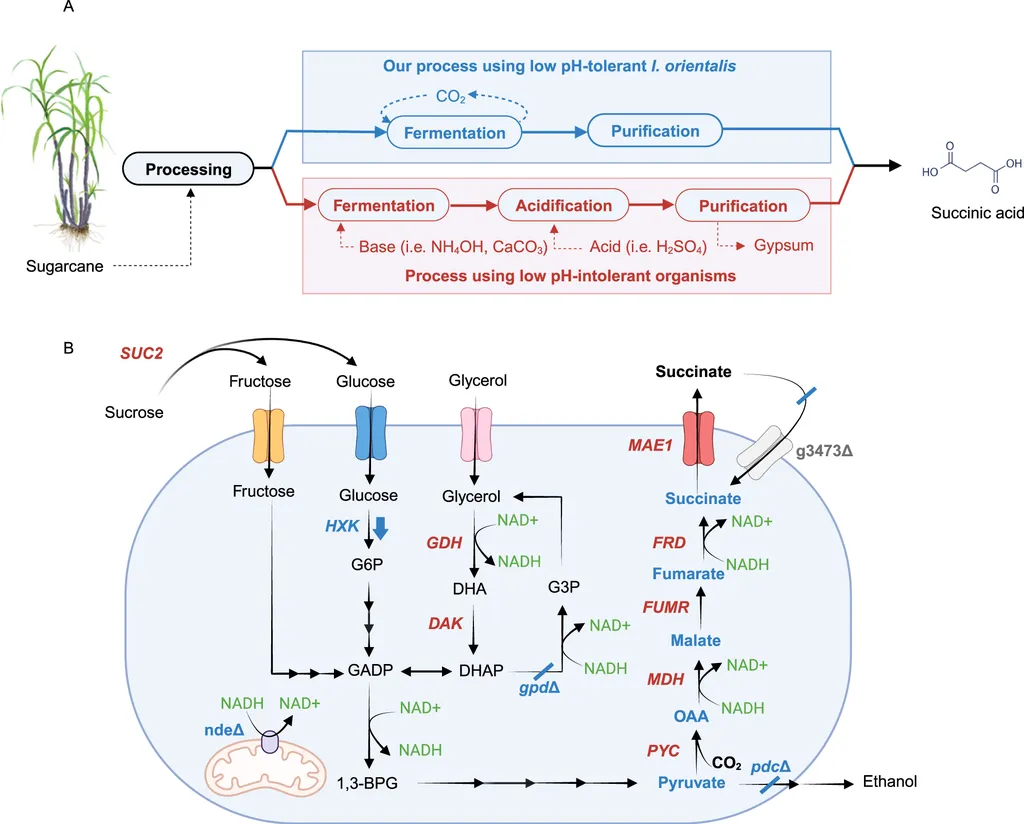In a significant stride towards sustainable bioprocessing, researchers have isolated a novel bacterial strain, Enterobacter sp. GAP1, capable of fermenting inulin-containing carbohydrates without the need for pre-treatment. This breakthrough, published in *Biotechnology Reports*, could revolutionize the production of succinic acid (SA), a valuable platform chemical used in various industries, including food, pharmaceuticals, and bio-based materials.
The study, led by Marcin Podleśny of Azoty Group Zakłady Azotowe “Puławy” S.A. and the Wacław Dąbrowski Institute of Agricultural and Food Biotechnology, demonstrates the potential of using Jerusalem artichoke (JA) tubers as a feedstock for SA production. The Enterobacter sp. GAP1 strain efficiently converts inulin, a polysaccharide found in JA, into SA, even under conditions of limited water availability.
“Our findings show that the GAP1 strain can produce SA in both liquid and semi-solid states, making it a versatile tool for bioprocessing,” Podleśny explained. The research revealed that using inulin as a carbon source in a liquid medium produced 29.4 g/L of SA. Ground and dried JA tubers resulted in a SA concentration of 17.9 g/L, while freshly squeezed JA tuber juice yielded 24.7 g/L. Notably, the strain achieved a SA concentration of 27.7 g/L under semi-solid state fermentation, highlighting its adaptability.
This research marks the first reported instance of a consolidated bioprocess for producing SA from inulin-containing materials. The ability to bypass acidic or enzymatic pretreatment not only simplifies the production process but also reduces costs and environmental impact. “The use of JA tubers as a feedstock is particularly promising, as it is a non-food crop that can be grown on marginal lands, reducing competition with food production,” Podleśny added.
The commercial implications for the agriculture sector are substantial. Jerusalem artichokes are hardy plants that require minimal inputs, making them an attractive option for farmers. The development of a consolidated bioprocessing method could stimulate the growth of a new agricultural market focused on industrial crops, providing farmers with additional revenue streams.
Moreover, the efficient production of SA from renewable resources aligns with the growing demand for sustainable and eco-friendly industrial processes. SA is a key building block for various bio-based products, including plastics, solvents, and pharmaceuticals. The ability to produce SA from inulin-containing feedstocks could enhance the economic viability of bio-based industries, fostering a more circular economy.
The research also opens avenues for further exploration. The Enterobacter sp. GAP1 strain’s ability to thrive in semi-solid conditions suggests potential applications in other bioprocessing scenarios where water availability is limited. Future studies could focus on optimizing the fermentation conditions and scaling up the process for industrial applications.
As the world seeks sustainable solutions to meet its chemical and material needs, this breakthrough in bioprocessing offers a glimpse into a future where agriculture and industry converge to create a more sustainable and resilient economy. The work of Marcin Podleśny and his team, published in *Biotechnology Reports*, underscores the importance of innovative research in driving the transition towards a bio-based future.

